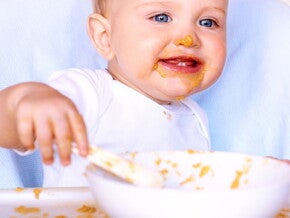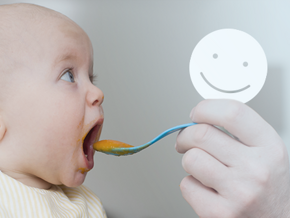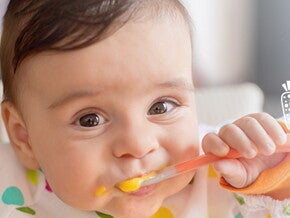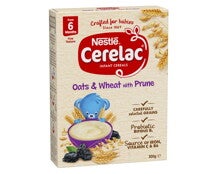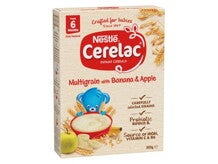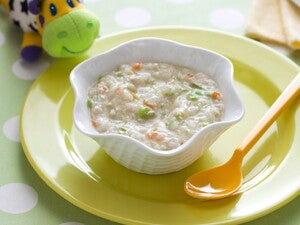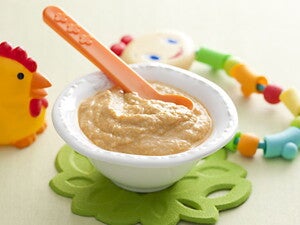
The Importance of Iron for Babies
An Australian nutrition survey showed that 75% of infants aged 6-12 months were not consuming enough iron. Learn more about why this is so significant and how you can boost your baby’s iron intake.
Why are iron rich foods so important for babies?
Iron is an essential nutrient needed for the growth and development of all infants. Iron supports many important functions within the body during the early years when your little one is undergoing rapid growth.
Iron is an important part of haemoglobin in red blood cells that transport oxygen around the body. This is how iron assists with energy levels, by making sure the body gets the oxygen it needs. Supporting the high energy demands of growing babies is so important for healthy development.
Another very important role is supporting brain development and function – at a time when your little one is undergoing rapid growth. From birth to two years of life, your baby's brain will experience rapid cognitive growth, as it increases in size and weight. Ensuring adequate iron intake, as part of a varied diet is critical in this step.
Iron also plays a role in supporting your little one’s immune system. A strong immune system is important for helping your baby fight off illnesses and stay healthy as they grow and explore the world around them.
What are some good sources of iron-rich foods for infants?
A baby is born with iron stores from their mum, via the umbilical cord. At around 6 months of age your baby’s iron levels naturally start to diminish and breast milk alone is no longer sufficient to cover the energy and nutrient requirements (including iron) of most infants. At this time, introducing solid foods will help bridge that gap.

Iron rich foods for infants 6-12 months can include:
- Red meat – Pureed beef, lamb
- Iron-fortified baby cereal
- Other meat – Pureed fish, chicken, pork
- Lentils and beans – Baked beans, lentil soup
- Eggs – Scrambled, omelette
Iron rich foods for toddlers 1-3 years can include:
- Red meat – Finely diced beef or lamb soups or stews
- Other meat – Softly cooked fish. Shredded chicken sandwich
- Lentils and beans – Baked beans on toast, lentil soup
- Eggs – Scrambled on soldier toast, quiche fingers
The Australian infant feeding guidelines (NHMRC, 2013) recommend starting on solid foods that contain iron, such as iron rich cereals made specifically for babies, to help meet your child’s iron requirements. Iron-fortified baby cereals are an excellent source of iron and a perfect first food to introduce due to the mild taste and appropriate texture. Look for an iron rich baby cereal that has no added sugar in the ingredient list.
Infants and iron: What you need to know about iron deficiency
An Australian nutrition survey (OzFITS, 2021) showed that 75% of infants aged 6-12 months were not consuming enough iron. Prolonged iron inadequacy can lead to iron deficiency and anaemia, which is a serious condition that can affect brain growth and immune function. Iron deficiency is one of the most common nutritional disorders in the world and is very preventable.
There are signs of iron deficiency in babies that you can look out for, including if your baby is:
- More tired than usual
- Looking paler than normal
- Not growing at a suitable rate
- Being unusually fussy (although this could be due to numerous reasons)
If you are concerned about your baby’s iron levels or any of these symptoms you should talk to your doctor as soon as practical.
Tips for maximising iron absorption
There are many foods and situations that can interact with iron absorption, both positively and negatively. It’s important to be aware of these, so that you can quickly adjust or amend what you’re doing to maximise your little one’s iron intake and absorption.
There are some babies that will need more attention than others when it comes to iron absorption, these can include babies that:
- Are on a vegetarian or vegan diet
- Have malabsorptive disorders
- Have had any stomach or gastro surgery
- Have not introduced solid foods by 6 months of age
Positive pairings with iron rich foods
Pairing iron-rich foods with foods that are high in vitamin C can help boost iron absorption. Try the following food pairings:
- Iron fortified baby cereal and mango
- Iron fortified baby cereal and pureed broccoli
- Pureed meat and pumpkin
- Mixed pureed spinach and chicken
- Mashed sweet potato with fish
Check out our recipes page for more inspiration.
How can CERELAC iron fortified baby cereal help my baby?
CERELAC iron fortified baby cereal is perfect for babies starting their solid foods journey as it provides key nutrients, such as vitamin C and iron in a volume suitable for an infant’s limited tummy size. Made with wholesome natural grains, carefully selected to meet the specific needs of babies, and no added sugar. CERELAC can be eaten alone or added to a range of other first-foods to build your baby’s flavour profile. With a texture suitable for babies starting on solid food, CERELAC can be enjoyed as part of a varied diet.
Iron fortified
CERELAC is a convenient way to increase iron intake as it contributes on average at least 33% of recommended daily intake (RDI*) per serve. Iron helps support brain development and growing immune systems.
Vitamin C
CERELAC provides a source of vitamin C. Vitamin C helps support growing immune systems and iron absorption.
Probiotic Bifidus BL
A probiotic similar to those found in the digestive system of breastfed babies.
Vitamin B6
The following two products, suitable for infants from 6 months, contain vitamin B6, another important nutrient that helps iron transport and metabolism.
• CERELAC Oats and Wheat with Prune
• CERELAC Multigrain with Banana and Apple
Age appropriate
Tastes and textures specifically designed to nourish and support the nutritional needs of growing infants.
*FSANZ RDI for infants 6-12 months.
References
- Health Direct Website. Accessed at https://www.healthdirect.gov.au/iron-deficiency#:~:text=Iron%20deficiency%20can%20cause%20problems%20such%20as%20fatigue,%20poor%20concentration
- Eat for Health Website. Accessed at https://www.eatforhealth.gov.au/nutrient-reference-values/nutrients/iron#:~:text=Wholegrain%20cereals,%20meats,%20fish%20and%20poultry%20are%20the%20major%20contributors
- FSANZ Standard 1.2.7 – Nutrition, Health and Related Claims. Accessed at https://www.legislation.gov.au/Details/F2014C01191.
- National Health and Medical Research Council. Infant Feeding Guidelines. 2012. Accessed at https://www.nhmrc.gov.au/about-us/publications/infant-feeding-guidelines-information-health-workers
- OzFITS publication by Moumin, N.A. et al. Nutrients 2023, 15, 1144. Accessed at https://doi.org/10.3390/nu15051144
- WHO. Nutritional Anaemias: Tools for effective prevention and control. Nutritional anaemias: tools for effective prevention and control. Geneva: World Health Organization; 2017. Licence: CC BY-NC-SA 3.0 IGO. Accessed at https://iris.who.int/bitstream/handle/10665/259425/9789241513067-eng.pdf?sequence=1
- Australian Food Composition Database. Accessed at https://www.foodstandards.gov.au/science/monitoringnutrients/afcd/Pages/default.aspx
NB:
- Cerelac Baby Rice = 1.5 mg Iron per 15g serve
- Cerelac Oats and Wheat with Prune = 6.2 mg Iron per 21g serve
- Cerelac Multigrain with Banana & Apple = 5.9 mg Iron per 21g serve
- Weet-bix = 3.01mg Iron per 21g serve, or 4.3mg per two biscuit serve (30g)
- Porridge Oats = 0.2mg/21g
